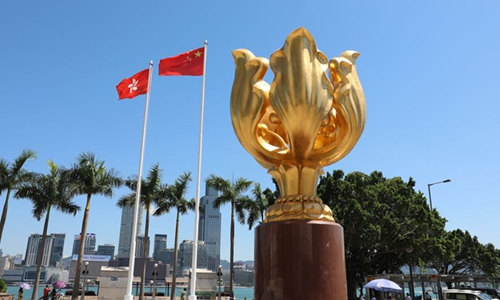Washington has no easy cards left on Hong Kong: Global Times editorial
Source: Global Times Published: 2020/7/13 21:48:40

Photo: Xinhua
A Wall Street Journal report on Sunday said the US is weighing limited options to punish China over Hong Kong. An unnamed senior Trump administration official told the newspaper that taking steps to destroy Hong Kong's pegged exchange rate to the US dollar has been excluded from the measures under consideration. The report said "major actions against Hong Kong's financial system risk hitting US, Western and Hong Kong companies and consumers," and "a more likely option is a suite of narrowly targeted sanctions."The US won't stop creating trouble for China over Hong Kong. But it's a fact that Washington has limited cards. The sanctions card that's easy for the US to use against China has already been used, and every approach it may take will be a double-edged sword that will also hurt itself. This fact is becoming clearer.
Hong Kong is still one of the most important places for financing as well as the source of the largest trade surplus for the US. As the US has so many interests in Hong Kong, how can it not be hurt if it targets Hong Kong?
The US also faces challenges in trying to rope in allies to sanction Hong Kong. The other four countries in the Five Eyes alliance closely followed Washington's steps, and only made symbolic moves. European countries responded coldly to adopt substantive sanctions.
Washington is trapped in a passive position. US actions cannot keep up with its high-profile manner, and its allies' responses are hardly substantive. The US should have expected such a situation.
Hong Kong is another important case in China-US disputes. China has been acting according to the bottom line of a sovereign state, and the US weapon is sanctions. But after more than two years of the trade war, the two sides' economic contest is close to a new balance. The US cost of further pressuring China has risen sharply, approaching the peak of what it can bear.
Chinese people have adapted to the stalemate with the US. We are aware of Washington's vicious intention to contain Beijing, and we no longer fantasize that the US will return to its past policy toward China. Meanwhile, we will not act rashly. We maintain a defensive position, but we are constantly consolidating our line of defense so that the US attacks will be strategically in vain.
Chinese society will be more and more confident in dealing with the US. The US has real teeth, but sometimes just a "paper tiger." The US can make some difficulties for China, but it cannot really harm China - this is what many Chinese people feel about the US today.
China has controlled the COVID-19 epidemic, but the US has been hit hard. This has especially made Chinese people more opportunistic about future China-US competition.
Chinese society has generally formed three consensuses on China-US relations:
First, China should avoid proactively provoking the US, and maintain stable China-US relations. We should not intensify China-US confrontations from our side or initiate a new cold war.
Second, China should stick to the bottom line of national interests, and not be afraid of US suppression, and bear the inevitable risks and costs.
Third, China should prepare for long-term China-US competition, and keep increasing its national strength and endurance against long-term external challenges.
The US has been suppressing China, which it views as a strategic competitor for more than two years, while China has remained steady in all aspects. The novel coronavirus epidemic is another test for China's strategic endurance, from which it deserves a grade of distinction.
One more or less card on Hong Kong will not pose any threat to the Chinese side. The US will suffer losses more or less with China together.
The biggest problem for the US is that it has lost its ability to evaluate China and assess the situation of China-US competition based on facts. It is overly ambitious and self-worshiping. It needs more time to wake up. China will accompany this generation of US political elites to grow up.
Posted in: EDITORIAL